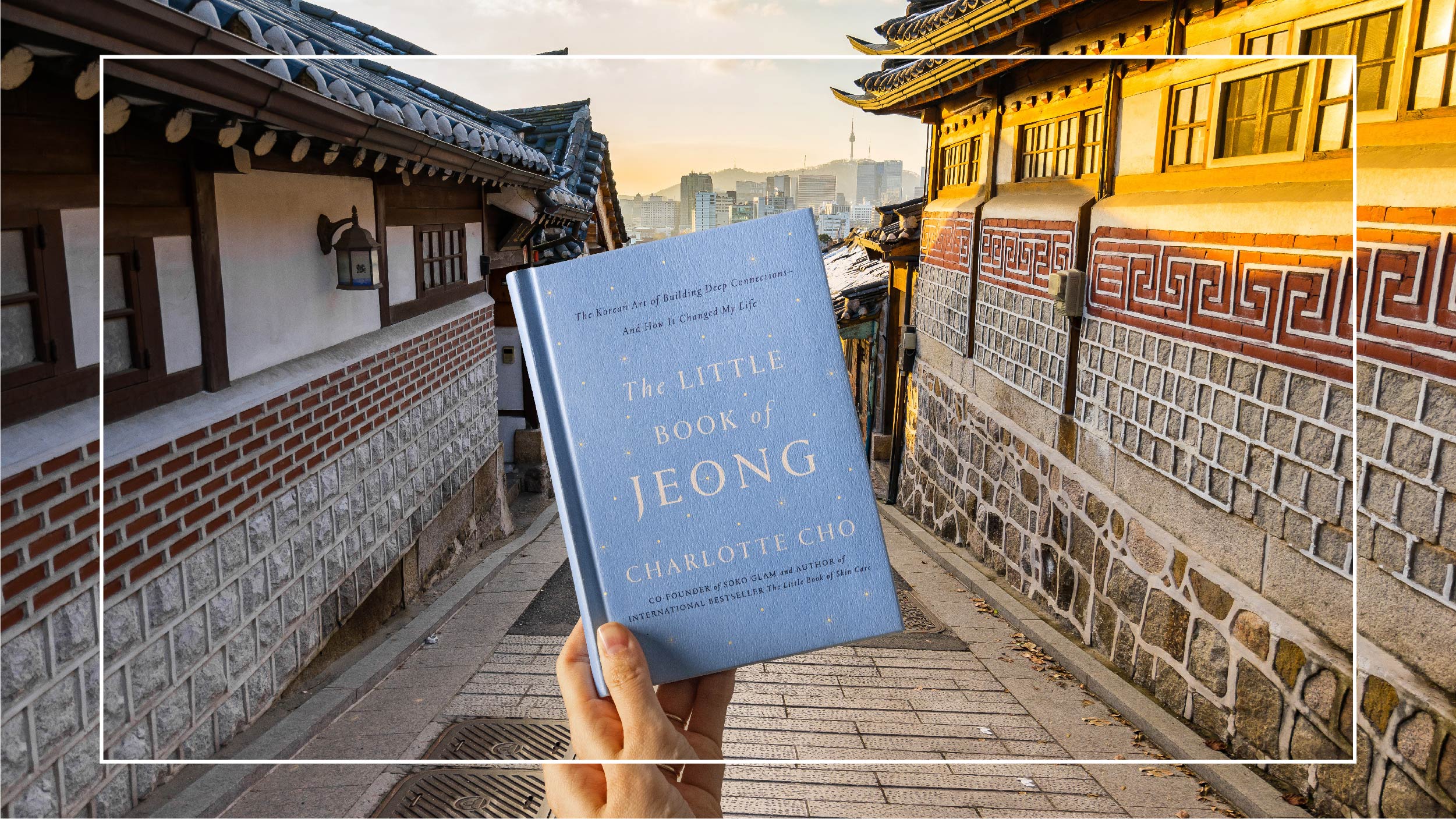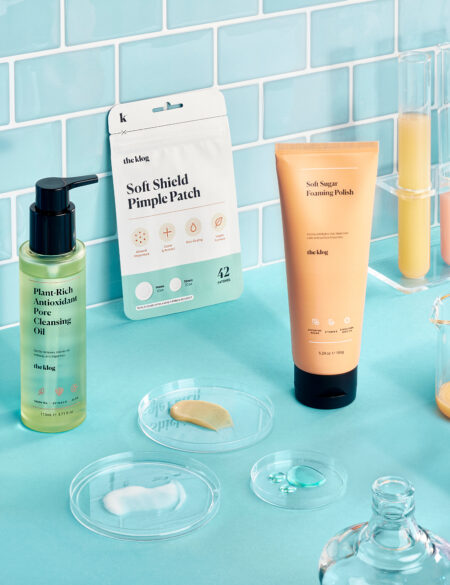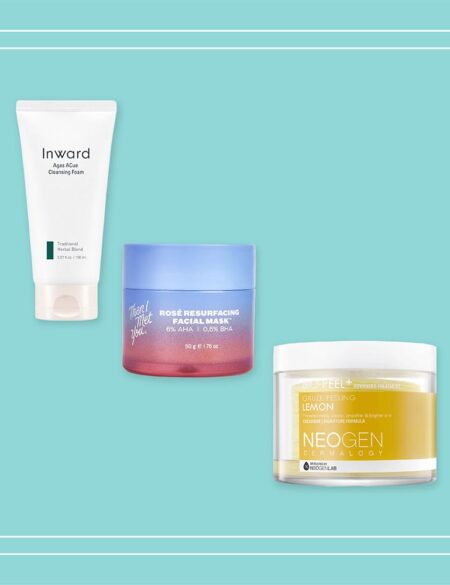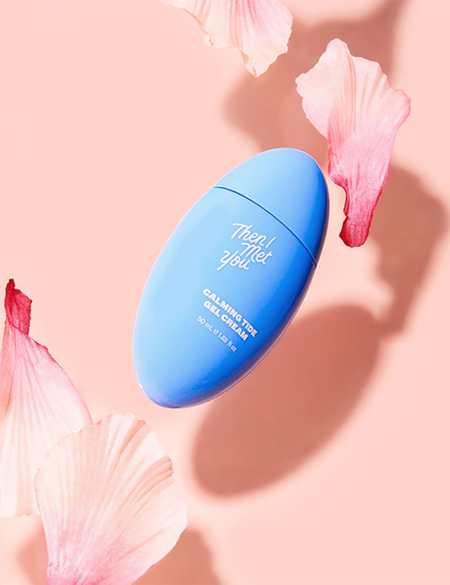One of the most important Korean cultural concepts, jeong is a deep and meaningful connection that can be felt between people, places and things. It goes deeper than love and friendship, and grows stronger with time. In South Korea, jeong is critical for success in every facet of daily life, because it encourages generosity, empathy and the cultivation of lasting bonds.
Read the excerpt below from the first chapter of Charlotte Cho’s new book, The Little Book of Jeong, which is now available on Soko Glam and Then I Met You.
My Journey to Jeong
My first brush with jeong took place more than 10 years ago. It was a warm day in late November when I, only 21, arrived at my hotel in Houston, Texas. It was my first time leaving my home state of California alone, and I had been expecting bare-bones accommodations since it was a no-name spot near the airport that catered to business travelers. But when I swung open the door I found, to my surprise, the most luxurious hotel room I’d ever seen.
I was used to traveling lean, without any of the frills. When I was growing up, my family and I would drive from Los Angeles to Las Vegas and stay at one of those dirt-cheap $60-a-night hotels like Circus Circus. When I had traveled to New York the year before, I had crashed on the floor of a friend’s apartment with nothing but a thin blanket. In college, I slept on a mattress on the floor, and for one summer, I even slept under my friend’s dining table in exchange for cooking and cleaning their apartment. So to me, this room was pure luxury. In fact, it wasn’t even a room—it was definitely a suite. It had an entire living room and an enormous bathroom with sparkling white granite tiles. The towels were plush and fluffy like they had just come out of the dryer. There was a huge mahogany desk, where I plopped down my backpack. I sat on the soft queen-sized bed and stared at everything around me, wondering if the hotel had put me there by mistake.
Everything felt so surreal: Only two months after seeing an ad for an open position at Samsung in the Korea JoongAng Daily, an English daily newspaper, I had received an email from the company about my application. Getting a response was a surprise on its own. It was only partly written in English and I had trouble reading the rest of it, which was in Korean. After finally deciphering it, I figured out that Samsung wanted me to come to Houston for an interview the following week and that they would put me up in a hotel and pay for my round-trip flight. As someone who didn’t have a lot of work experience, I was a bit stunned. My family and my friends were also skeptical that I could ever land a job at one of the largest and most prestigious companies in the world.
But I was dying to get to Korea. I had become deeply interested in the culture and wanted to learn the language. Despite the fact that my parents had both been raised in Seoul, I had never visited growing up and felt I had a lot to catch up on. I was fresh out of college and depressed over the prospect of spending the rest of my 20s in the same state I had lived all my life. With no responsibilities tying me down in California and up for a new adventure, I jumped at the chance to go to Korea. Within a few hours, I had my fingers crossed and a flight booked to Houston.
My interview was set to take place the morning after I arrived, and as the novelty of the suite began to fade, I started to panic. I realized I was utterly, hopelessly unprepared. I wondered if I would have to speak Korean. Why didn’t I listen more attentively during those Saturday Korean language classes I took growing up? Better yet, why did my parents not speak Korean to me more regularly? I had friends who were fairly fluent, even though they had grown up in Southern California like I had; their parents and grandparents had made it a point to only speak to them in Korean. I was so nervous about what I was going to say and how I was going to sound in my interview that, even with the fluffy bed, I barely slept at all that night.
The next morning, I got up and got dressed. The only thing I felt prepared for was my interview outfit. To help me, I had watched a few Korean dramas that were playing at the time—All In and Full House—to get some clues as to what Korean fashion was like. I took some inspiration from Song Hye-Kyo, who played the lead in both dramas, and I opted for a mid-length black skirt with pantyhose and heels. Other than for a school play, I had never ever worn tights and was even confused about where to buy them (the mall or the grocery store?), but I did own a pair of black Steve Madden pumps and a white button-down. As I took a quick glance at my reflection in the full-length mirror by the hotel door, I felt a little more at ease. At least I looked suited for the position—though in hindsight, I probably looked more like a card dealer at a casino, much like the one Song Hye-Kyo played in All In.
Downstairs in the lobby, my heels click-clacked across the floor as I followed the Samsung signs to the conference room, where the interviews would be taking place. I was greeted by a friendly and chatty Korean man named Woo-Shik, who looked just a smidge older than me. He started to speak in Korean, but I must have looked like a deer caught in headlights because he immediately switched to English. “Are you here for the interview? For Samsung?” he asked. I nodded enthusiastically.
He led me to where I was supposed to wait with the other candidates and made small talk as we walked. “Hey, you live in L.A. right? Have you ever seen Nicole Kidman? What? No? How about Brad Pitt? Angelina Jolie?”
He started to rattle off names of celebrities like he’d just memorized the latest issue of Us Weekly. I tried to answer as honestly as possible—without disappointing him, of course—but the whole time I kept thinking, who is this character? Although he was smartly dressed, it didn’t feel like the start to a professional interview at one of the largest companies in the world. But I told him about how I did once see Barry Pepper from Saving Private Ryan at a grocery store and started to relax. Maybe the interview wouldn’t be so bad after all.
When it was time, Woo-Shik (who turned out to be the Samsung international recruiting officer) ushered me into a room with a chair in the middle. There were three older gentlemen, only slightly younger than my dad, staring back at me. They did not look like they were going to speak English. My shoes were starting to pinch. Oh my God, I thought to myself, I’m not prepared for this.
“Charlotte . . . Lee?”
“Yes.”
“Thank you for coming.”
“Thank you for having me?”
“한국말할수있어요?” (Do you know how to speak Korean?)
“조금 . . . 요.” (A little.) I pinched my fingers together to sign language my Korean.
“미국에서 태어났어요?” (Were you born in the U.S.?)
Crickets.
“I was born in California. I’m sorry I don’t speak Korean that well.”
“It’s okay. Samsung is a global company. If you work for Samsung, everyone speaks English.”
A wave of relief washed over me as we switched to English, and they asked me about graduating from the University of California, Irvine and working at an ad agency. “It says here you graduated in 2006,” one of them said, reading off my résumé, “but you started in 2003.”
“Yes,” I said, nodding. “I graduated in three years. It wasn’t an accelerated program, I just took more units per semester and graduated early.”
They looked at each other and started whispering to one another. I tried, but failed to read the expressions on their faces. “Why would you want to graduate earlier?” one asked.
I swallowed and told them the truth. “It was cheaper,” I said. “I paid for college myself, and three years was more economical than four.”
More murmuring, looks, and nods.
“What do your parents do, Charlotte?”
I hesitated. I wasn’t sure if sharing my dad’s occupation was going to increase or decrease my chances of getting this job, but as soon as I caught myself hesitating, I felt guilty, as though I was ashamed of my parents. “My dad . . . he owns a store,” I said. “A liquor store in Whittier.” Then, maybe because of the guilt, everything else came pouring out. I told them how my parents could have paid for me to go to college, and in fact, they had wanted to so that I could completely focus on school. But I didn’t want them to—they worked really hard, and they had already paid for enough. Besides, I’d had a job since I was 16. I liked being financially independent, and I saw no need to stop.
Telling these strangers about my parents made my eyes prick with tears, and I blinked them back as quickly as I could for fear they’d well up and spill over. Do not cry during a job interview, I told myself. You’re going to look weak.
If they noticed my tears, the men didn’t acknowledge them. Instead, they told me that they were sure my parents appreciated that; I nodded in agreement. There was one VP, sitting right in the middle of the group, who hadn’t said a word the entire interview. He had a kind face, like a soft, fuzzy peach. Now, he spoke up, surprising me with the fluidity of his English. “Charlotte, how do you feel about public relations or communications?” he asked. “I think you’d be great for that team.” I told him that yes, I was interested in public relations. “And don’t worry about the language,” he added. “Samsung is a global company, and everyone is asked to speak English. You’ll fit right in.”
I smiled and thanked him, while my brain was doing backflips. What had he just said? What did he mean I’d be great for that team? Did I get the job? It couldn’t be. They had hardly asked me any questions.
I stumbled out of the room in a daze and unsure what to feel other than relief that it was over. Back in the lobby, Woo-Shik asked me how much I had paid for my flight. I told him $486. He rolled out an envelope and handed me $500. In cash. And I was done.
Later that evening, my dad called and asked me how everything had gone. I tried to sum it up for him the best that I could: They had asked a few questions about my family, it hadn’t felt like a real interview, and I hadn’t thought I had done well, to be honest. But at the same time, I couldn’t help but feel that I had the job.
My dad made it clear that he was happy for me either way. “That’s great, Charlotte,” he said. “Now get home safe.” Little did we know that what I had just experienced in that room would change my life forever.
***
Within a few months, I found myself at LAX airport, clutching a one-way ticket to Seoul after getting an offer from Samsung. Everything still felt surreal. I didn’t know what to expect, so I started to set low expectations for everyone, just in case I failed miserably working in Korea. I told my friends and family that this would be a one-year thing and that I’d be back. I even told my brother he could borrow the new car that I had poured all my savings into (I had bought it prematurely, not knowing I would receive this unique opportunity) and to take care of it, so that it would be as good as new when I returned. One year would go by in a flash, I thought to myself.
I wasn’t the most prepared for the move. I decided not to find an apartment in advance and luckily was able to crash with Jo, a friend that was living in Korea at the time. In my excitement over becoming a bona fide Seoulite, I bought a long black coat with faux fur trim that looked like it belonged in a Korean drama, then called it a day. I was moving in early March, which meant it would still be cold, especially for someone coming from L.A.
I was still confused about what I was going to do, but I practiced my Korean diligently in those weeks leading up to my departure. Still, I knew that one month of study wouldn’t make up for 21 years of neglect. I reassured myself that everyone would speak English at work because that’s what the nice VP with the pleasant smile had said. Regardless, it would be an adventure in a country I was excited about, so I was ready to wing it.
I remember my first day at work like it was yesterday. I was reunited briefly with Woo-Shik, who brought me to the floor where the Public Relations and Investor Relations teams sat. He introduced me to a burly man with a large humidifier that practically took up half of his desk. I would eventually know him to be my direct manager, and he literally laughed at me and said in Korean, “I hope you know that no one speaks English in this team except for you.” (Later, I would find out that many of my team members were so shy about speaking English that they had been dreading my arrival. Ouch.)
The day passed and I sat at my desk, tidying up for the twelfth time and looking at an empty email inbox. The next day, I was asked to physically cut a few relevant news articles about the industry out of the Wall Street Journal, paste them onto printer paper with a glue stick, then scan them into a file. The rest of the week I did the same thing, growing more and more defeated by the hour. I had been so excited to dive into a new career and work on impactful PR projects. Instead, I felt my ambitions were quickly dashed, and I was stuck with busywork that resembled third grade–level arts and crafts. To be fair, it’s not like there wasn’t work to be done, but I don’t think anyone knew what to do with a Korean-American girl that only spoke English.
The next week was more eventful, but not in a good way. The whole team went out to lunch to welcome me. I ate my kimchi jjigae (stew) in silence until Mr. Hong, who was the head VP of my department, asked me to stand up and introduce myself. Not expecting this, I was mortified. Everyone stared at me as they waited. I slowly stood up, bowed awkwardly, then quickly stated my name and that I was happy to be there. If there were tumbleweeds in the city of Seoul, it would have been the perfect time for them to roll past. After my speech abruptly ended, there was scattered applause. As I plopped down into my seat, I wished the chair would disappear into a hole until it was time for me to go back to California.
Despite that being the most uncomfortable lunch of my life, my team didn’t allow me to crawl into that hole. Every day from then on, I spent the majority of my time with the same people. Not only did we work together, we ate breakfast, lunches, and dinners together. Dinners at Korean BBQ restaurants were particularly special, as we huddled around the embers of hot coals, pouring drinks and cutting up only the tender pieces of meat for each other. Over our many meals together, they got to know the details of my family, my food tastes (and that I really could handle my soju), while I got to quiz them on everything from politics to societal pressures in Korea. I even made friends with team members from different departments that were on the same floor, and we would grab coffees, take breaks, and plan out weekend activities together.
During stressful late nights at the office, we would take trips to the convenience store to fill ourselves up with snacks and cups of Maxim, my favorite Korean instant coffee. The dark, nearly silent floor was punctuated by sporadic fits of laughter as they taught me how to swear in Korean and poked fun at me by impersonating my terrible American accent. Day in and day out, throughout the bitter winter (the jacket and faux fur did not cut it), I got to nourish these relationships and soon, I felt more at home. We got so comfortable with each other that they even made fun of my unbrushed hair and how little I knew about skin care—and I didn’t mind. They were practically like my long-lost brothers and sisters.
Finally, spring came, which then turned into summer. It felt like I had just begun to settle into my apartment and was getting my multi-step skin care routine down pat when the trees started to change into fall colors. It had been my first time experiencing real seasons, and even I, who had predicted how fast a year in Seoul would go by, was caught off guard that my one-year anniversary in Korea was quickly approaching.
***
For the holidays, I made plans to visit my family in California, which meant I would be leaving for a few weeks. As I was saying my goodbyes, my colleague Sang-Ho, who was part of the broadcasting team, said to me in Korean, “It’ll be weird without you here. I mean, we have jeong with you now.”
“You have what with me now?” I asked. “Jeong? What’s that?” My Korean had improved, but it was clearly one of many words that I still didn’t know.
He tried to explain it. “Jeong . . . it’s hard to explain. It’s a type of feeling.” He was struggling to find a definition, so he recruited Hae-Mi, another team member, to help me understand what he was talking about.
“Hey, Hae-Mi, what’s the English word for jeong?”
She furrowed her brows and tried spitting out some words, but was ultimately at a loss. My other colleague Chang-Dong, who sat in the cubicle next to me, pulled up the dictionary on Naver. “Naver says it means affection.”
Sang-Ho replied, “Hm, that’s not it either. That’s really a watered-down version of what jeong is.”
Hae-Mi agreed. “Yeah, it’s not exactly it,” she said. “It’s much more complex than that. But when you feel jeong, you’ll know it.”
With that vague description, I wasn’t sure what they were talking about. But curiosity got the best of me. I started to ask everyone around me, and the more it was explained, the more I grew to understand. I learned that jeong is a Korean word used to describe a deep and meaningful connection that builds over time and through shared experiences with other people, places, or things. I hadn’t realized it at the time, but jeong had been present in my life from when I first landed in Korea. It was the countless dinners with the communal bottle of soju that we passed and poured gingerly with two hands into cups for one another. It was every late night at the office when a team member would take the extra time to help me translate the documents I couldn’t do quickly myself. It was the feeling I got when my uncle woke up extra early, so he could drop me off at work when it was snowing the hardest. It was the 20,000 Korean won (about $20 U.S.) that was handed to me by my colleague so that I could get home safely in a cab. And I would soon come to realize that jeong had seeped into my every pore. I didn’t just love my adopted city—I had jeong with Seoul and the people in it too.
Discovering jeong was when everything clicked. And the more I tried to understand it and cultivate it in my life, the more happiness and success followed. I thought often about the interview I had back in Texas. I hadn’t been the strongest contender for the role, considering my lack of experience and inability to speak Korean. I wondered if my sudden display of emotion, filled with jeong for my parents, had played any part in their decision to give me a chance at this unique opportunity.
After a few years at Samsung, I ended up working briefly for that very kind VP who had interviewed me on that fateful day in Houston. Because the question still lingered, I worked up the nerve to ask him why he’d been so sure to select me for the position when I wasn’t the most qualified candidate out there. He paused intently, as if it would be difficult to explain. Then he finally said, “I could see it in your eyes that you would have the same deep connection to this job as you do for your family.”
And that is the power of jeong.
Get The Little Book of Jeong NOW on Then I Met You and Soko Glam!














